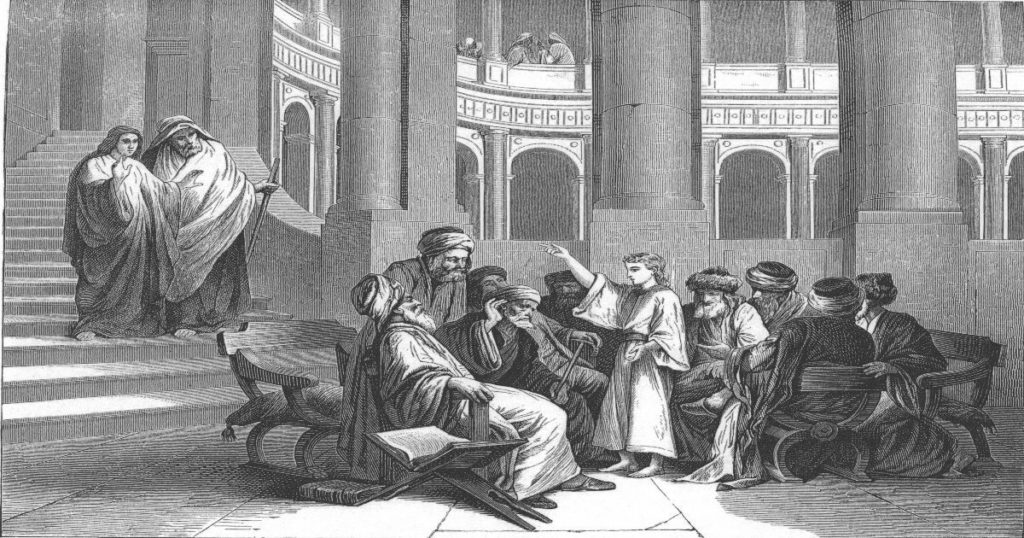Bethlehem Lutheran Church, Lebanon, OR
Readings: Deuteronomy 18:15–20 | 1 Corinthians 8:1–13 | Mark 1:21–28
Text: Mark 1:21-28
That Sabbath in Capernaum was a remarkable day. Jesus and his disciples came to the synagogue service, and Jesus began to teach. In an age when anybody with a webcam and some provocative things to say calls themselves a teacher, it might not sink in how significant Jesus’ teaching was. We heard in the Old Testament reading from Deuteronomy 18:15-20 that God would raise up a prophet like Moses to whom the people should listen. Yet, that same passage also warns of false prophets, and the death sentence earned by their folly. But that threat didn’t stop many from assuming the teaching role. This came to a head during the days of the prophet Jeremiah, when the false prophets told people “no disaster will come upon us, nor shall we see sword or famine” (Jer. 5:12) Meanwhile, Jeremiah proclaimed the Word of the Lord, which said that judgement was coming and to go willingly into exile.
During and after the Exile, in order to have a repeat of what happened, the Mishnah emerged with trusted rabbis commenting on the Law of Moses. Instead of anyone presuming to say, “Thus says the Lord,” they would instead cite the authority of these Tannaim, or teachers. However, the focus of these commentaries was on how every Israelite and the community as a whole, would walk faithfully and so avoid God’s wrath.

22 And they were astonished at his teaching, for he taught them as one who had authority, and not as the scribes.
The people marveled at the teaching of Jesus because it stood out. It came with authority of its own. And immediately, that authoritative teaching is challenged:
23 And immediately there was in their synagogue a man with an unclean spirit. And he cried out, 24 “What have you to do with us, Jesus of Nazareth? Have you come to destroy us? I know who you are—the Holy One of God.” 25 But Jesus rebuked him, saying, “Be silent, and come out of him!” 26 And the unclean spirit, convulsing him and crying out with a loud voice, came out of him.
The demon identifies Jesus as none other than the Prophet Moses had foretold: The Holy One of God. Demons were purportedly exorcised by playing on the lyre (David and Saul) or burning herbs and dunking people in water. They had folk cures, exorcisms, purification rituals. Yet, all the previous things people had tried had limited success.
But when Jesus came into that synagogue at Capernaum, His word simply worked. No incantations, no strange-smelling brews. He simply said, “Be silent, and come out of him!” He commanded the unclean spirit, and it actually obeyed Him! Never before had something like this happened!
Even King Saul, who was afflicted by an evil spirit from the Lord, only found relief when David played. But that was a partial remedy, and only seemed to work as long as David played. When his hands got tired, Saul would start hurling spears at David again (1 Samuel 16:14-23; 18:10-11).
Just as it was in Jesus’ day, we have our experts who have the cures to every ailment you could imagine. Although we defer to highly-educated experts and the cures they prescribe may have unpronounceable names, they still only offer partial relief. They may have a knack for physiological ailments that previous generations lacked, but they completely overlook the spirit of a person. They treat our bodies like a machine that needs repair, and for that they only have partial or temporary success.

Yet, we put our faith in them. Sometimes the medical community is able to “fix” the problem and “get results.” But don’t forget that sometimes, they are simply dumbfounded. Don’t forget the times when they diagnose things wrong and give an ineffective or harmful cure. Like the scribes, they have the ability to help, but in a limited way and with clouded understanding.
But enter Jesus, Lord of Life, Lord over Satan, Lord over all things. By a Word, He puts even demons to flight. If you thought the world was struggling to engage COVID-19, they would be completely clueless on demon possession. And we’re no stronger in our own ability: “For we do not wrestle against flesh and blood, but against the rulers, against the authorities, against the cosmic powers over this present darkness, against the spiritual forces of evil in the heavenly places.” (Eph. 6:12) But not Jesus. He speaks; and it happens—no matter how big or bad the enemy is. Even our arch-enemy, Satan, must flee at the Lord Jesus’ command (James 5:7).
The congregation gathered in Capernaum marveled because they heard the Lord’s teaching, they heard His command, and they witnessed the convulsing, the crying out, and the exit of the demon. But now, we are those for whom it’s said, “Blessed are those who have not seen and yet have believed.” (John 20:29) Now, the same Lord works by His powerful Word, but it is only apparent to the eyes of faith.
This past week, we had a former member who was sick in the hospital with a serious infection. Many of you know Mike personally. In order to help his body combat the infection, the doctors induced a coma. Talk about going out on a ledge! But our congregation prayed for him. The God of life heard our prayers, and is restoring his health. He called this week to, “Thank your church and for the prayer chain you put me on. It works, by the way, and I’m testifying to that. I’m doing much better. A few more days of therapy and I can go back home to my loving wife and my loving God.” We don’t believe in the effectiveness of prayer because of this one instance, but because of the powerful Word of God: “Ask, and it will be given to you; seek, and you will find; knock, and it will be opened to you. 8 For everyone who asks receives, and the one who seeks finds, and to the one who knocks it will be opened.” (Matt. 7:7-8) Prayer works because Jesus, Lord of Life, does His work.

But recognize the parallels between the congregation at Capernaum and us: We, like them, are gathered together on the day of worship. The Lord Jesus is in our midst with His rule over death, devil, and hell. He is here for the healing of those buffeted by Satan and burdened with the weight of living in a world cruelly ruled by death. So, we must also see the parallels in the remedy He brings: When Jesus speaks, it works; it accomplishes that for which He says it [Isa. 55:9-11]. And from the very start of the service—provided we believe He is able to do this—He is there releasing us from our sins. A preview of the Judgement Day is given: You are forgiven because Christ has borne it all for you.
And here, we sit nearly two thousand years later with our unique afflictions, and our weakness. This incredible, Almighty Lord is here with us, and yet so easily we fail to recognize His presence and His benefits! Just leave me be, and I’ll find a way somehow. Everyone else seems to, after all. But the Holy Spirit, using the example of the Capernaum synagogue worshippers has something to teach us. More than meets the eye is at work with the Lord Jesus.
A few centuries after our Lord cast out unclean spirits with a word, a bishop by the name of Cyril of Jerusalem was teaching newly-initiated Christians. About the Lord’s Supper, he said,

Since then He Himself declared and said of the Bread, This is My Body, who shall dare to doubt any longer? And since He has Himself affirmed and said, This is My Blood, who shall ever hesitate, saying, that it is not His blood?…Wherefore with full assurance let us partake as of the Body and Blood of Christ: for in the figure of Bread is given to thee His Body, and in the figure of Wine His Blood; that thou by partaking of the Body and Blood of Christ, mayest be made of the same body and the same blood with Him. For thus we come to bear Christ in us, because His Body and Blood are distributed through our members; thus it is that, according to the blessed Peter, we became partakers of the divine nature.[1]
So when we are gathered (synagogue’d) under the powerful Name of Jesus, we have an assurance that He is at work for our good. It’s true that God is with each of His children every day and in every place. But in this place, we intentionally set aside the rest of our earthly life and dwell for a time in the special presence He promises in worship.
Our worship also ties us back in tradition to 300’s when Cyril was teaching those who have gone before us in the faith. I’ll share last excerpt from him, because it’s a reminder to us to be aware of what is happening—invisible to the eyes, but visible to faith—in the service. This is about the preface before Communion:
After this the Priest cries aloud, “Lift up your hearts.” For truly ought we in that most [awe-full] hour to have our heart on high with God, and not below, thinking of earth and earthly things. In effect therefore the Priest bids all in that hour to dismiss all cares of this life, or household anxieties, and to have their heart in heaven with the merciful God. Then ye answer, “We lift them up unto the Lord:” assenting to it, by your avowal. But let no one come here, who could say with his mouth, “We lift up our hearts unto the Lord,” but in his thoughts have his mind concerned with the cares of this life At all times, rather, God should be in our memory but if this is impossible by reason of human infirmity, in that hour above all this should be our earnest endeavour.[2]
This reminds us of the peril of leaving our trust in our own lives, and all other earthly helps. They are all impotent, and the Lord Jesus alone can save. Lord Jesus, hear our prayer and break our ties to temporal concerns while we are here in this place with You! Crush our idolatrous ways which rely on our own or others’ help. Fill us with awe at your Word, by which you cast out the devil, and rescue us from his evil plans and our own foolishness!

By His authoritative Word, by the blood of His Cross, by His trampling Satan under His feet, and by the means of grace He delivers that victory to us—you and I have unshakable peace. Amen.
[1] Cyril of Jerusalem, Catechetical Lectures 22.1–3
[2] Cyril of Jerusalem, Catechetical Lectures 23.4
Leave a Reply